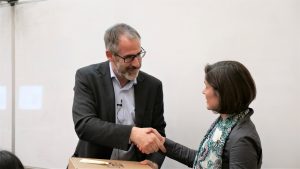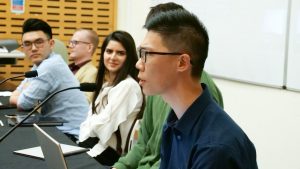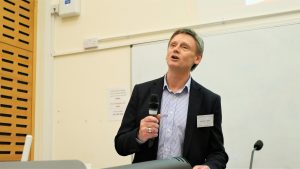By Sheri Djafer, Centre for Higher Education Research and Scholarship
The in-person three day event which took place on the South Kensington Campus, brought over 150 people together discussing ‘Transition and Transformation’. With many external keynote speakers invited to present, the event gathered the attention of many members of the Imperial community from across College.
This years theme for the event ‘Transition and Transformation: Thinking, Experiencing and Being in STEMMB’ was inclusive of perspectives College wide as it invited many speakers from different Faculties to participate and share practice.
This years event welcomed Professor Oguz Acar, Kings College London who discussed ‘Discovery-Based Learning and Innovation in Disruptive Times’; Dr Christine O’Dea, University of Huddersfield discussing ‘AI text generators and assessments – realizing the potential benefits to students and tutors in higher education contexts’; Dr Peter Kemp, Kings College London discussing ‘Overview of the assessment and pedagogical system’; Dr Reuben Shipway, University of Plymouth discussing ‘Chatbots and AI – a new frontier in higher education’; and Kate Ippolito discussing ‘Reciprocal emotional interaction in university classrooms: Who influences feelings of coping and succeeding, and how?’.
Attendees also had the opportunity to network on all 3 days while viewing different posters each day which showcased recent education innovations. The poster session is also available to view online. This was followed by a social networking event on the final day of the event which brought the community together.
Celebrating our achievements
The Imperial Festival of Learning and Teaching warmly welcomed Professor Peter Haynes, Vice-Provost (Education and Student Experience) who opened the event by saying “The Imperial Festival of Learning and Teaching is a fantastic opportunity for us to celebrate our recent achievements and innovations. As well as this, to look forward to the challenges and opportunities that are ahead of us”.
“We recognise the importance of the wider student experience alongside the delivery of our educational programmes in the classroom and the mental health and wellbeing of our students”.
Professor Haynes also closed the event with a speech and awarded Dr Andreia Vargas-Seymour with a prize as she gained the most votes for ‘favourite poster’.

Student perspectives
This years event included input from many students across the three day event. This included presentations jointly by students and staff such as ‘Student Research Networks – A model for the enhancement and enrichment of research education’ by Dr Aaron Lett and Cecilia Dunsterville; ‘App(roach) for Facilitating Communication and Educational Boundary Crossing on Sustainable Development’ by Dr Mark Pope and Milan Paczai.
We also welcomed student perspectives in the format of two plenary panels, the first was a panel of students who discussed “Exploring the Impact of Digital Technologies on Assessment and Feedback: Student perspectives” by Jason Zheng, Stephanas Lim, Yasmin Baker, Runtian Wu, Rea Tresa, Shi Wei Yuan and was chaired by Dr Thomas Lancaster, Computing Department. In this panel discussion, students across disciplines shared insights into their experiences of assessment and feedback at university, with a particular focus on the role of digital technologies and artificial intelligence in the assessment process.

The second panel was made up of staff and students “Interactions and Wellbeing: Exploring Student and Staff Experiences of ‘Being’ in our STEMMB Context” by Nathalie Podder, Aglaia Freccero, Anthea MacIntosh LacRoque, Hannah Bannister, Anna Goodwin. Students and staff from across the College exchanged and shared their experiences of studying, working, socialising, and ‘being’ at the College by exploring questions such as how we can cultivate a supportive environment that prioritises the wellbeing of both staff and students.
Mutual Wellbeing
Professor Martyn Kingsbury opened the final day of the event highlighting that “we will have some great talks and input from across college which will help us think about how we interact with our students for our mutual wellbeing encouraging us to all learn and all fail in a safe and positive way”.
Professor Kingsbury emphasised that we need “a safe psychological space where we can take risks together in our innovative teaching and their learning and we can all learn from our failures in a way that doesn’t disadvantage us and drives things forward in a brave and appropriate way”.

The EDU team are looking forward to hosting the Imperial Festival of Learning and Teaching next year and may have a little surprise for you in store…
Quality posts is the key to invite the visitors to pay a visit the web site, that’s what this web page is providing.